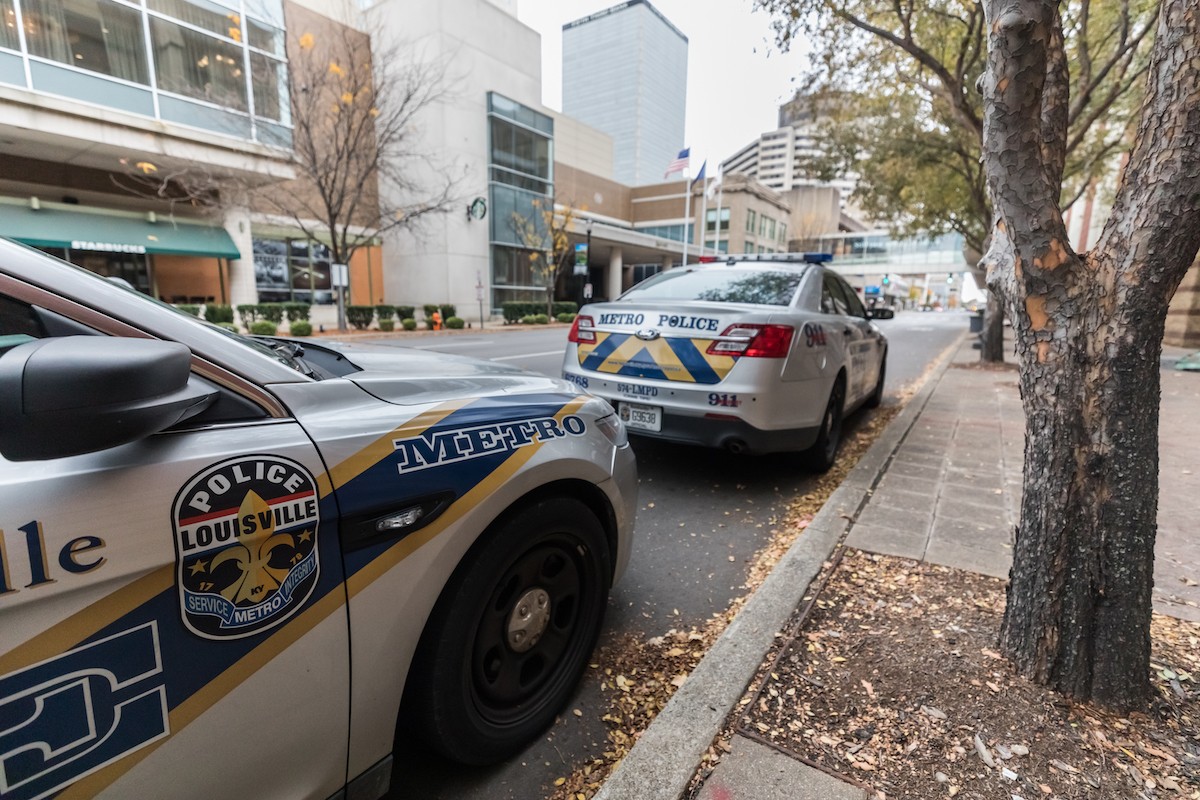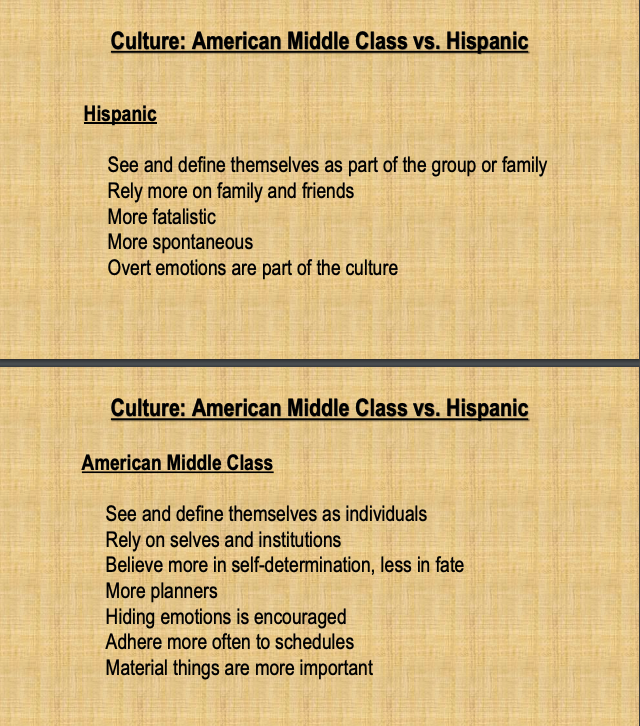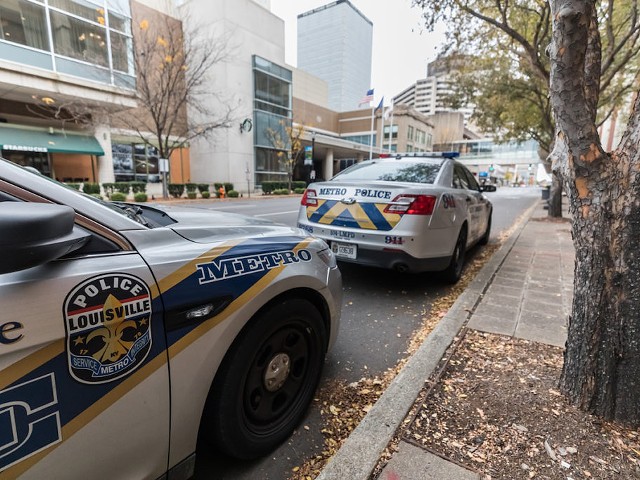Spontaneous. Fatalistic. Emotional.
Those are the qualities attributed to Hispanic people in materials used in a Louisville Metro Police Department recruit basic training class that aimed to have students be able to “identify aspects of Hispanic/Latino culture that may pose hazards to law enforcement.”
In a slideshow obtained by LEO Weekly, those characteristics are contrasted with what the training materials say are cultural traits of members of the “American Middle Class,” which include: “Rely on selves and institutions,” “Believe more in self-determination, less in fate,” “Hiding emotions is encouraged” and “Adhere more often to schedules.”
LMPD provided a 39-page slideshow in response to LEO’s open records request for materials used in a one-hour course titled “Law Enforcement Spanish: Basics of Hispanic/Latino Culture & Officer Safety” that was listed on the training academy’s 2020 curriculum.
According to an outline in the curriculum, at the end of the course, recruits would be able to “identify various aspects of Hispanic/Latino culture and how they differ from Mainstream USA” in addition to being able to identify the potential “hazards” posed by aspects of the culture.
Randy Shrewsberry, a former police officer who is the founder and executive director of The Institute for Criminal Justice Training Reform, found the premise of the course, as well as its title, troubling.
“Frankly, painting one culture, or a subset of a culture, as inherently more violent, or posing unique threats, than another is simply racist,” said Shrewsberry. “I think the danger is that when you have singled out one culture as having unique threats, then any interaction the police may have with this group is going to be approached differently, which unfortunately would likely mean more aggressively.”
In a written statement to LEO Weekly, an LMPD spokesperson said: “The LMPD Training Academy is currently amidst curriculum refinement. The referenced slides were removed and we continue to evaluate all of our training to ensure we are in line with national standards and best practices in law enforcement training.”
LMPD did not immediately respond to a question about when the force stopped using the slides. LMPD also did not respond to questions on whether the course was still offered and if so, whether the goals listed on the 2020 curriculum remained the same.
In a statement to LEO Weekly, Karina Barillas, director of Louisville’s La Casita Center, a grassroots non-profit serving the Latinx community, called the training materials “offensive” and potentially dangerous.
“This kind of one size fits all rhetoric causes separations of us [vs] them, discrimination and a misunderstanding of people’s realities,” she said. “Latinx families and individuals, coming from 24 different countries and with countless different experiences, should not be painted with a brush of ‘standard' values and behaviors. The whole community deserves better-prepared officers whose leaders equip them with the knowledge of this diversity — it is a disservice to these officers as well if they are taught assumptions that lead to confusion and possibly dangerous conflict in the line of duty. We are all worthy to be treated as individuals, not as a stereotype.”
The slides comparing and contrasting Hispanic and American middle class culture were followed by a series of slides with titles that included “Machismo,” “Jesús Malverde & La Santa Muerte,” “Proxemics & Conversational Manner,” “Concept of Time,” “Motherhood,” and “Attitudes About Law Enforcement.” All but one of the 10 slides included a title and photo but no additional text.Other experts on policing found the training troubling as well.
“I don’t know if it’s telling them not to trust, but I think it’s telling them to be at a heightened sense of awareness: That you need to be ready any time you go into the Latinx community, because they can be spontaneous, because they can be fatalistic,” said Edwardo Portillos, chair of the University of Colorado Colorado Spring’s Sociology Department, whose research has focused on relations between police departments and Latinx communities.
And priming officers for such heightened awareness could be dangerous.
“Something like this — these slides, these assumptions or these stereotypes that are created — it could lead to someone in the community needlessly losing their life,” said Portillos.
Xavier Perez, a professor of criminology at Chicago’s DePaul University whose research focuses on the Latinx community and who has studied the impact of police training on officer behavior and community relations, said the training materials “other-ized” members of the community while playing on stereotypes and presenting them as a threat.
“This reminds me of some very problematic training that we used to see in the ‘80s and the ‘90s,” he said. “In many ways, it’s kind of sad to see it still being used today, because it sensationalizes the groups, it plays on stereotypes.”
The end result of the slides comparing Hispanic culture with that of the “American Middle Class,” he added, was the feeling that one group — the “middle class” — were upstanding citizens who believed in law and order while the other group, Hispanic people, might not be.
The use of the word “spontaneous” referring to Hispanic people in the slideshow, he said, told officers “you kind of have to be mindful of them. It creates them as a threat.”
The LMPD spokesperson said training had been designed by “a retired Spanish-speaking LMPD sergeant and current Hispanic female officer with input and assistance from graduates of our Latino Citizens Police Academy.”
Police training materials have been a source of controversy in Kentucky recently.
Earlier this month, WDRB reported that former Department of Criminal Justice Training employees had called training slides produced by the department to teach about human trafficking “racist and derogatory” in their portrayals of Black people.
Mónica Negrón, director for Hispanic, Latinx and Indigenous Initiatives at UofL, said she found the course goal of identifying cultural aspects that may pose hazards to law enforcement “unsettling.” She also questioned why the dividing line was between the middle class and Hispanic people when there are so many Hispanic and Latinx people in the middle class.
“If they’re making the comparison, I feel like they’re also making the assumption that Hispanic and Latinx individuals are all immigrants, not citizens nor Americans, and also assuming that they fall in a lower class,” she said. “One shouldn’t assume that because someone is a part of a certain race and looks a certain way that it automatically classifies them as holding a different socioeconomic status.”
Shrewsberry, the police training reform advocate, said that more than training, it is diversity in the staffing of a police department that ultimately reduces biases and racially disparate policing practices.
According to LMPD’s November demographics report, there were a total of 29 Hispanic officers making up 2.8% of the force. Jefferson County is 7.5% Hispanic according to data from the 2020 census.
Omar Salinas-Chacón, affiliate equity officer for the ACLU of Kentucky’s board of directors, was born in El Salvador and a DACA recipient. To him, the training materials were unsurprising.
“It only takes two eyes to see how police treat people of color differently as opposed to white people,” he said. When his family first first moved to the US, “it was very apparent to us that because we were from a different race, we were treated differently by police. Unfortunately, this material just confirms to me what we already knew in the community.”
Keep Louisville interesting and support LEO Weekly by subscribing to our newsletter here. In return, you’ll receive news with an edge and the latest on where to eat, drink and hang out in Derby City.








